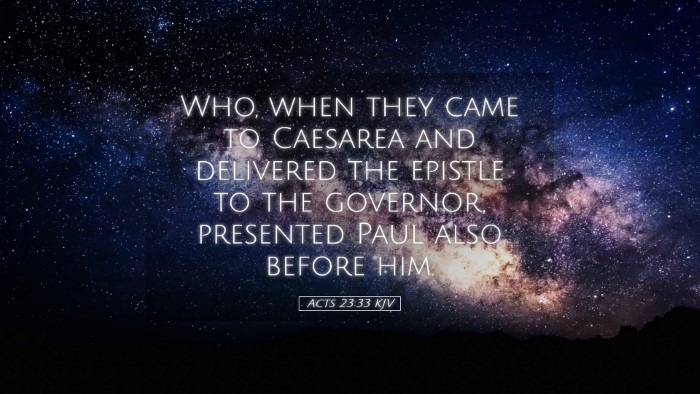Commentary on Acts 23:33
Acts 23:33 states: "When they came to Caesarea and delivered the letter to the governor, they also presented Paul to him." This verse is significant in the narrative of Paul's journey, providing insight into the Roman legal system and the providence of God in safeguarding His messenger.
Contextual Background
To fully appreciate Acts 23:33, it is essential to consider the surrounding context in which this event occurred. Paul had been taken into custody in Jerusalem due to accusations from the Jewish elders and the tumult which ensued. The ensuing events led to a plot against his life, prompting the Roman cohort to transfer him to Caesarea for his protection.
Key Insights from Commentary
-
Matthew Henry:
Henry emphasizes the fulfillment of God's promise to Paul, asserting that the Lord would protect him and ensure his journey to Rome. The transfer to Caesarea is viewed as part of the divine plan, allowing Paul to continue his mission despite the adversities faced in Jerusalem.
-
Albert Barnes:
Barnes highlights the importance of the letter delivered by the commander. This letter served both as an official account of Paul's situation and as a defense against the accusations. It showcases the Roman authorities’ role in executing justice, and how God used these secular powers to ensure Paul’s safety.
-
Adam Clarke:
Clarke discusses the geographical significance of Caesarea, noting it as the seat of Roman government in Judea. This move to Caesarea represents a shift from the tumultuous environment of Jerusalem to a more stable and orderly setting. Furthermore, Clarke notes that Paul’s presentation to the governor was not merely administrative but pivotal for the advancement of the Gospel.
Theological Implications
This verse carries profound theological implications concerning divine sovereignty, the role of government, and the providential care of God in the lives of His servants. The transition to the governor's jurisdiction symbolizes a theological theme observed throughout Acts: God’s orchestrated movements to spread the Gospel beyond geographical and cultural boundaries.
Divine Providence
God's protective hand over Paul illustrates the doctrine of providence. Despite human opposition, God remains sovereign over the circumstances of His people. This verse invites pastors and theologians to reflect on how God may be using current circumstances, including political and social structures, to fulfill His purposes and to protect His servants.
Legal Proceedings and Justice
The formal presentation of Paul to the governor signifies the importance of justice and legal process in the early Church. This aspect serves as a reminder that Christians are not to shun or ignore civil authorities, but rather engage with them. The Church is called to uphold righteousness within the societal framework, advocating for justice while continuing to proclaim the Gospel.
Practical Applications
-
For Pastors:
Reflect on the ways God has protected and provided for your ministry. Consider emphasizing trust in divine providence as congregants face challenges.
-
For Theologians:
Examine the role of Roman authority in early Christianity and the implications it has for understanding the Church’s historical context.
-
For Students:
Investigate the historical background of Paul's imprisonment and subsequent trial. How do these events correlate with the teachings of Christ on suffering and perseverance?
Conclusion
Acts 23:33 serves as a pivotal moment in the narrative of Paul’s apostolic journey, demonstrating the intricate workings of God's providence and the steadfastness required of His servants in the face of adversity. The insights gleaned from the commentaries of Matthew Henry, Albert Barnes, and Adam Clarke not only enhance our understanding of this passage but also challenge us to consider the implications for our faith and practice today. As we reflect on Paul’s experience, may we be encouraged to trust in God’s overarching plan, embrace our role within the systems of society, and commit ourselves to the mission of the Gospel.


